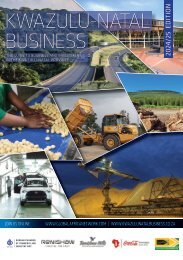Limpopo Business 2017-18 edition
A unique guide to business and investment in Limpopo. Limpopo Business 2017/18 is the ninth edition of this highly successful publication that has, since its launch in 2007, established itself as the premier business and investment guide to the Limpopo Province. This edition of Limpopo Business is officially endorsed by the Office of the Premier of Limpopo. This book contains detailed insights into the plans of the Limpopo Economic Development Agency (LEDA) and the recently launched bus rapid transport system for the provincial capital, Leeto la Polokwane, together with a comprehensive register of all provincial government and municipal contact details. Investment news related to mining, telecommunications and tourism is carried in overviews of all the main economic sectors. To complement the extensive distribution of the print edition of the magazine, the publication is also available online at www.limpopobusiness.co.za.
A unique guide to business and investment in Limpopo.
Limpopo Business 2017/18 is the ninth edition of this highly successful publication that has, since its launch in 2007, established itself as the premier business and investment guide to the Limpopo Province. This edition of Limpopo Business is officially endorsed by the Office of the Premier of Limpopo.
This book contains detailed insights into the plans of the Limpopo Economic Development Agency (LEDA) and the recently launched bus rapid transport system for the provincial capital, Leeto la Polokwane, together with a comprehensive register of all provincial government and municipal contact details. Investment news related to mining, telecommunications and tourism is carried in overviews of all the main economic sectors.
To complement the extensive distribution of the print edition of the magazine, the publication is also available online at www.limpopobusiness.co.za.
You also want an ePaper? Increase the reach of your titles
YUMPU automatically turns print PDFs into web optimized ePapers that Google loves.
SPECIAL FEATURE<br />
mined. The LDP notes that it<br />
is also important for planners<br />
to “promote diversification and<br />
multi-skilling of the workforce,<br />
in order to mitigate the risks of<br />
shocks associated with commodity<br />
price dips and mine<br />
closures”.<br />
The following areas have<br />
been identified as priority<br />
zones for the industrialisation<br />
strategy: Polokwane, Lephalale,<br />
Tubatse, Tzaneen and the<br />
Makhado-Musina corridor.<br />
Strategic infrastructure<br />
In as much as the <strong>Limpopo</strong><br />
Development Plan is aligned<br />
with the broader National<br />
Development Plan, there are<br />
several national Strategic Infrastructure Projects<br />
(SIPs) which affect <strong>Limpopo</strong>.<br />
Three in particular will make a big impact, namely<br />
SIP 1 (Unlocking the Northern Mineral Belt with<br />
Waterberg as the Catalyst), SIP 6 (Integrated Municipal<br />
Infrastructure Project) and SIP 7 (Integrated Urban Space<br />
and Public Transport Programme). The last two influence<br />
developments in the provincial municipalities of<br />
Lephalale, Mopani, Sekhukhune, Capricorn, Vhembe<br />
and Polokwane.<br />
Other national SIPs of relevance relate to green<br />
energy, agri-logistics and rural infrastructure,<br />
regional integration and water and sanitation<br />
infrastructure.<br />
Within <strong>Limpopo</strong>, the Premier’s Infrastructure<br />
Coordinating Committee (PICC) is a vital component<br />
in the rollout of new infrastructure. There are<br />
several locally driven projects boosting the provincial<br />
economy and are being promoted within<br />
the context of this <strong>Limpopo</strong> Development Plan:<br />
construction of Nwamitwa Dam; raising of Tzaneen<br />
Dam wall; integrated Mooihoek Water Scheme; reticulation<br />
from De Hoop and Nandoni Dams; purified<br />
water supply to Bela-Bela, Modimolle and<br />
Mookgopong local municipalities; rural access roads<br />
in support of agriculture and tourism clusters; solar<br />
photovoltaic electricity generation; information<br />
and communication technology; infrastructure at<br />
Polokwane International Airport; nodal infrastructure<br />
for the priority growth points; and adequate maintenance<br />
for all existing infrastructure.<br />
Each of these infrastructure improvements will<br />
make life better for local residents, and they will also<br />
create a more conducive environment for investors.<br />
The <strong>Limpopo</strong> Department of Economic<br />
Development, Environment and Tourism (LEDET)<br />
is coordinating the province’s strategy to attract investors.<br />
Key to the plan is public investment into<br />
priority growth points in selected economic sectors.<br />
These cluster priorities underpin the economic part<br />
of the plan:<br />
• Coal: Petrochemical and Energy Cluster in Lephalale<br />
(Green City urban development, Growth Point)<br />
• Platinum Cluster in Mokopane and Tubatse (Mining<br />
Supplier Park)<br />
• Musina-Makhado Corridor Mining Cluster<br />
• Phalaborwa Mining Cluster (Copper, Phosphate<br />
and Magnetite)<br />
• Polokwane and Musina Logistical Hubs<br />
• Various Agricultural Clusters, based on Agri-parks<br />
• Various Tourism Clusters, in every district.<br />
Existing tourism assets include two UNESCO World<br />
Heritage Sites (Mapungubwe National Park and the<br />
Makapan Valley) and the iconic Kruger National Park.<br />
There is enormous potential for growth in cultural<br />
tourism where small villages could offer experiences<br />
based on traditional practices, unique arts and crafts<br />
and local cuisine.<br />
Cluster Value-Chain Development Strategies,<br />
including beneficiation opportunities, have been<br />
developed for each of these clusters by the LEDET.<br />
International relations is the responsibility of<br />
national government, but the LDP has flagged a<br />
number of potential areas for regional integration<br />
that would be mutually beneficial: relationships with<br />
Botswana and Zimbabwe relating to the Coal and<br />
Energy Cluster in Lephalale and the Mining Cluster<br />
in the Musina-Makhado Corridor; an agreement<br />
with Zimbabwe to improve the efficiency of the Beit<br />
Bridge Border Post, as part of the Logistics Cluster;<br />
and an agreement with Mozambique relating to<br />
tourism and nature conservation.<br />
23 LIMPOPO BUSINESS <strong>2017</strong>/<strong>18</strong>


















